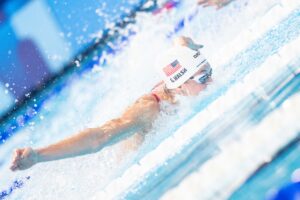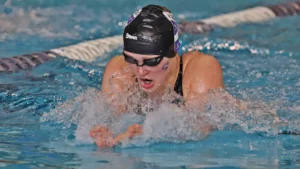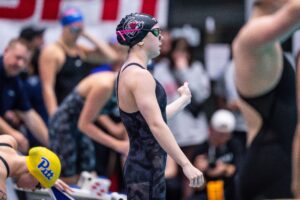We’re into the middle of January now and while the postseason is inching closer, there are still a few more weeks of dual meets left on the calendar. Historically, January has been a “slow” month in college swimming as teams come off a big block of winter training and begin to look ahead to their end-of-year goals.
But college swimming is changing and teams aren’t waiting for the NCAA Championships to swim fast anymore. In this transitional period for the sport, it’s difficult to gauge whether an exceptionally fast swim or a bad one has any significance. But there certainly are takeaways, so let’s talk about what we’ve learned, or maybe reinforced, through the first two weeks of January.
Gretchen Walsh Is Fast

Gretchen Walsh (photo: Jack Spitser)
Ok, maybe this one isn’t exactly breaking news—we knew this before. And neither is it news that she can throw down historic swims no matter what point in the season it is. But, her 20.87 50 butterfly split from Virginia’s senior meet against Virginia Tech is another in her growing list of “out of this world” fast swims.
A 20.87 50 butterfly split is the fastest in history, clearing the 21.50 mark that Walsh swam at a dual meet last season. She owns the top three performances in history and is now almost a second faster than the next fastest performer, Maggie MacNeil, who split 21.85 at the 2022 Art Adamson Invite.
Walsh obliterated the 50 butterfly short-course meters world record last month, becoming the first woman to break 24 seconds. It’s worth noting that Walsh’s fastest three performances—the three fastest all-time—all come from dual meets. Walsh typically swims the backstroke leg of the 200 medley relay at ACCs and NCAAs, meaning that as fast as she’s already been on the butterfly leg, she could have an even faster split in her if she swam this leg while tapered on the opening night of an NCAA Championships.
An NCAA Record Has Been Broken In Each Division Before The Postseason

Courtesy: Marty Fuller/Kenyon Athletics
In another indication of just how fast this season has been, we’ve got another new NCAA Division III record on the books before the postseason. This means at least one NCAA record has been broken in Division I, II, and III already this season.
Two-time defending DIII NCAA 100 breaststroke champion Jennah Fadely broke the division record in her signature event on the first day of Kenyon’s two-day tri-meet against Division I mid-majors Princeton and Navy. Though Princeton dominated the event, the Kenyon women went 1-2 in the 100 breaststroke on Day One, as Fadely popped a 59.62, breaking the record of 59.77 that KT Kustritz swam in 2018.
The swim is a .18-second drop for Fadely, and she’s now the only swimmer in Division III to break 1:00 this season as she eyes another DIII title. Her closest competitor is teammate Gabby Wei, who holds down the #2 spot in the division with the 1:01.05 she swam at this meet.
Second Semester Rosters Are Still In Flux
There’s still a lot unsettled as teams gear up for the 2025 postseason. We’ve seen some key athletes make their debuts for the season—or a new team—this month, and there could still be updates in the coming weeks. It’s been a lot to keep track of, but here’s a table of the latest additions/losses for top Division I programs.
| ADDITIONS | LOSSES | ||
| New Additions (First Year or Transfer) | Returning/Slated to ReturnTo Roster | Recently Confirmed Not Racing This Season/No Longer On Roster | Out Due To Injury |
| Katie Grimes, Virginia — first-year | Alex Walsh, Virginia — 5th year returning from injury | Adam Chaney, Florida — in transfer portal | Aiden Hayes, NC State |
| Chris Guiliano, Texas — transfer | Mona McSharry, Tennessee — 5th year returning from semester off | Noah Nichols, Virginia | Arsenio Bustos, NC State |
| Caspar Corbeau, Indiana — grad transfer | Rafael Mirolsaw, Indiana — spent first semester on World Cup circuit | Tim Connery, Virginia | |
| Matt King — transfer, was training at IU first semester but not racing | Ksawery Masiuk, Texas — was slated to arrive in Jan, now expected in fall 2025 | ||
| Ole Eidam, Michigan — first year | |||
| Lars Antoniak, Cal — first year, committed last spring, did not race first semester | |||
| Camille Henveaux, Cal — first year | |||
Katie Grimes, Chris Guiliano, and Caspar Corbeau all made their season debuts this past week. Grimes is in her first year at Virginia, while Guiliano transferred to the Longhorns from Notre Dame and Corbeau was a mid-season graduate transfer from Texas to Indiana.
All collected wins at their debuts. Grimes went three for three, winning the 200 back (1:51.56), 200 fly (1:53.23), and 200 IM (1:55.62). Guiliano wasted no time injecting energy into Texas’ sprint freestyle group, perhaps their biggest weakness as they gear up for an NCAA title chase. He swam 19.04/41.89 at the Longhorns’ dual against SMU, shooting to the top of Texas’ season depth chart in the 50/100 freestyle.
Corbeau debuted at Indiana’s dual against Michigan, the week after Rafael Miroslaw and Matt King competed in their first meet for the Hoosiers. He swam 51.49/1:51.65 in the 100/200 breaststroke, split a 22.84 50 breaststroke, and a 42.15 100 freestyle.
It’s January, and for these swimmers, the times are more of a starting point than anything. While the times don’t necessarily provide much information about how these athletes will swim in the postseason, their arrivals now provide their programs the opportunity to adapt to them being on the roster. For example, how does the influx of Miroslaw, Corbeau, and King—all of whom can be helpful on a sprint freestyle relay—change relay lineups and allow people to shift events?
All of these athletes afford their schools more flexibility and options for relay lineups and individual event slates, which is worth tracking through the rest of the dual meet season and conference championships as schools like Virginia, Indiana, and Texas eye an NCAA title.
Carles Coll Marti and Mitchell Schott Keep Rolling

Mitchell Shott(photo: Jack Spitser)
The men’s side of the Virginia v. Virginia Tech dual was highlighted by the newly minted short-course 200 breaststroke world champion Carles Coll Marti. Coll Marti has been consistently fast in yards all season, culminating in a surprise 200-breaststroke world title in Budapest. Now back in yards, Coll Marti has picked up where he left off. At the meet, he tied the 100 breaststroke ACC record, hitting a 50.78. The swim improves on his own Virginia Tech record, which he set at 50.94 at the 2024 ACC Championships.
Coll Marti had been flirting with his 100 breaststroke PB all season; he swam 51.10 at the Wolfpack Elite Invitational and then 51.00 at the Virginia Tech vs. South Carolina dual on Jan. 4. He’s been on fire in the 200 breaststroke as well, where he’s sat atop the NCAA rankings for much of the season. He owns a lifetime best of 1:49.99 in that event and has been 1:50-point four times this season, getting as close to his lifetime best as a 1:50.09 at midseason.
Schott has been exceptional for the Princeton Tigers this season, setting multiple school records and four entries to the mid-major all-time top 10 through December (200 free, 200 fly, 200 IM, 400 IM). At the same meet as Fadely reset the DIII 100 breaststroke record, Schott was busy rewriting Princeton’s record books. He took down the school records in the 500 and 1000 freestyle, swimming 4:15.76/8:52.16.
South Carolina Women Lead Flurry of “Upsets” At Dual Meets
The South Carolina women have much to be excited about after the team’s performance over the last 10 days. First, the Gamecocks beat the Virginia Tech women, 175.16 to 124.83. The next weekend, they mounted a successful second-half comeback against Auburn and put the meet away—barring disqualification—before the 400 free relay. They won 152.5 to 147.5. According to the South Carolina press release, it was the first time the women had beaten Auburn in a dual meet.

Amy Riordan (photo: Jack Spitser)
We ranked South Carolina as an “honorable mention” in our post-invite power rankings, while Virginia Tech and Auburn made the top 25 teams. Dual meet results aren’t the best prognosticator of performances at conference or NCAA championships since the formats are completely different, but if the South Carolina women can translate these gains into the postseason format, then they could easily earn a ranked spot in the next power rankings.
They aren’t the only teams earning wins that qualify as upsets. The mid-major Harvard men took down the Big 12’s Arizona in their head-to-head last weekend, leading the entire meet. David Schmitt broke his 200 fly program record to highlight the day, breaking 1:42 for the first time with a 1:41.25 and climbing to fourth on the mid-major all-time top 10 list. Freshman Joshua Chen moved up the program’s all-time ranks in the 100/200 breast (53.62/1:56.99), while Anthony Rincon, Sonny Wang, and Adriano Arioti added event wins, reinforcing it was a full team effort to take down the Power 4 program, 178 to 122.
Finally, the DIII MIT women took down the DI Boston University, 188.5 to 92.5. The MIT men made it close as well, but the Terriers snagged the victory by two points. This marked MIT’s second win over a DI program this season with DIII record holder Kate Augustyn, Ella Roberson, and Sarah Bernard contributing multiple individual event wins. The freshman Bernard broke another school record, swimming 4:53.11 to break a 13-year-old program record.
It is January, so it is worth asking if these results will have any bearing on postseason performance. But while it’s valid to question if these results are worth taking with a grain of salt, it’s also possible to view these results as teams hitting their stride at the right time. It certainly gives a sense of what disciplines are strongest for the victorious teams and where they can press the advantage of depth whether it’s a dual meet or a conference championship.
The MIT women in particular are going to get a big test this coming Friday, as they take on Williams and NYU in a tri-meet. At the 2024 DIII NCAA Championships, these teams finished 3rd-5th overall, with NYU in third, Williams fourth, and MIT fifth.
